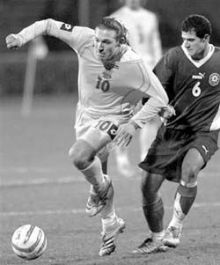As soon as they were off the plane, each member of the Ukrainian national soccer team, formed by the Ukrainian Soccer Association for the trip to Baky to compete in a friendly match with its Azerbaijani counterpart, was queried about Andriy Shevchenko. It seems that every Azerbaijani with the slightest knowledge of soccer wants only one thing: to see Europe’s top player of 2004 with his own eyes.
Instead, the Ukrainian team featured national coach Oleh Blokhin, who in his day was named Europe’s top soccer player. Journalists, autograph hounds, and other interested people formed a tight circle around Blokhin wherever he appeared in public. Older Azerbaijanis seemed especially moved; to them Blokhin is not simply a celebrated soccer player but the embodiment of the old way of life that will never return.
In soccer terms a match with the Azerbaijani team was a bit of an enigma. Friendly matches are usually staged with an eye to certain strategic goals. It is anyone’s guess what brought the Ukrainian national team to Baky, considering that soccer is practically destroyed in Azerbaijan. Before the game Blokhin said that the main thing for him was to meet the other team, watch his players in the field, and see who could do what and how well. Those were good intentions, except that every player has to reckon with his own circumstances — particularly in the case of Shevchenko, Tymoshchuk, and Shovkovsky, who could not fly to Baky due to various reasons. Their places on the team are practically never discussed.
The same appears to be true of Voronin, Rotan, and Husiev. As a result, these members of the national team have been showing symptoms of folie de grandeurs. Or take Kalynychenko from Moscow’s Spartak, who must still be convinced that the national team needs him. The same is true of practically all the other soccer players. For some the goal is to play on the main team. Others simply want to go along for the ride to the World Cup finals as members of the national team. How can all these goals be melded in a team whose performance will not bring us shame? Blokhin himself appears to be thinking about this, although he does not always speak his mind. But back to the main stadium of Azerbaijan’s capital city, recently named after the soccer referee Bakhramov. What can the Azerbaijanis do if they have neither world-caliber players nor coaches? So they take pride in the man who left a mark on world soccer history. In 1966 Bakhramov made England the world champion by confirming the dubious goal scored by the English team in the final match against the West German team.
The stadium was not full, either because soccer buffs knew that Shevchenko was not playing on the team, or because the tickets were too expensive. Another possibility is that Baky residents are not accustomed to attending soccer matches. Or maybe the bad weather played its part. Even in Azerbaijan late February is not too comfortable for sitting in the stands. The Latvian referee, Sipajlo, led both teams onto the field at 18:00 local time.
It is impossible to say anything about the host team, not because they don’t know how to play soccer at all in Azerbaijan, but because there is practically no basis for comparison. The Azerbaijani national team is little known in terms of other championships, and even the keenest Ukrainian soccer fans can hardly be suspected of having followed its progress. The names of the Azerbaijani players told us nothing — most likely they never will. The Azerbaijanis had an opportunity to challenge a participant in the world finals, so they were determined to do their best and then some. At certain moments during the game they succeeded. Perhaps for the first time in its history the Ukrainian national team was playing the role of the favorite. This is a completely new experience. More often than not, the Ukrainian team has played the role of a diehard rookie, winning and losing games now and then. Being a soccer master seems a bit premature; we’re not Brazilians yet. The Ukrainian team spent the first half of the game played at a slow pace, which explains the almost complete absence of quick attacks, except for Kalynychenko’s shot that bounced off Aliyev’s goal post. The reason for the slow pace was the halfbacks’ low mobility. Husin, Rotan, Kalynychenko, Husev, and partly Voronin were running at varying speeds. Pushed to the front, the forward Belik was openly bored, waiting for his chance. He got it in the second half, when a series of replacements gave a fresh impetus to the game and made it less predictable. But neither the guest nor host team used the opportunity to score. If anything, the match became more edgy toward the end.
When the game ended in a tie, 0:0, there was nothing to say. After the referee’s whistle blew, ending the match, Blokhin offered the usual statements designed to keep his thoughts from the public (we can only hope that he made them for his own sake), all the more so as no other friendly matches are planned for the Ukrainian team in the next couple of months. Blokhin’s remarks to the Azerbaijani press became livelier when he recalled the days of the past. As for the present, there is nothing much to say. There’s nothing but nostalgia.







